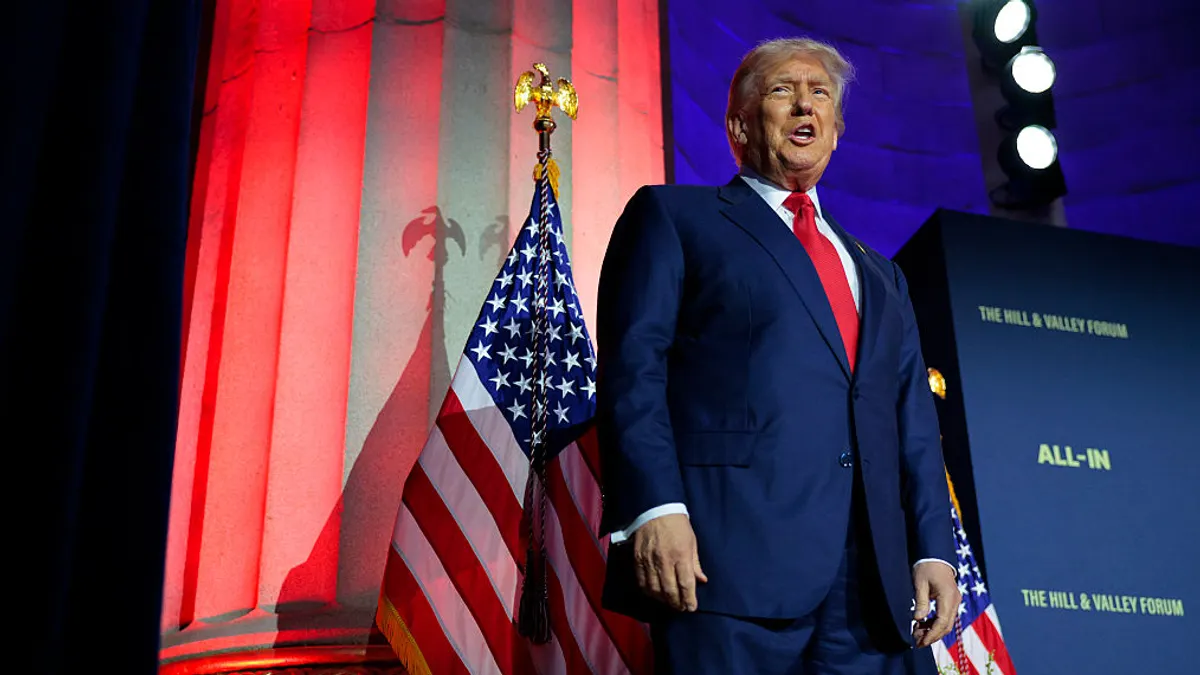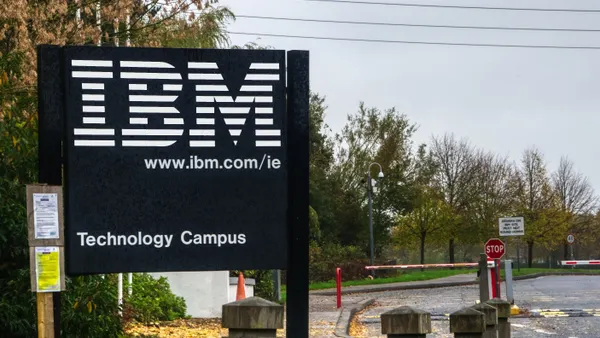Dive Brief:
- President Donald Trump signed a trio of executive orders targeting AI infrastructure, exports and development on Wednesday during a summit in Washington D.C.
- The sweeping executive orders aim to, in part, fast-track federal permitting, streamline reviews and expedite construction of major AI infrastructure projects. Increasing AI exports is another focus. The administration also banned the federal government from procuring AI that “has been infused with partisan bias,” Trump said.
- “From this day forward, it will be a policy of the United States to do whatever it takes to lead the world in artificial intelligence,” Trump said during the event. “America is the country that started the AI race. I'm here today to declare that America is going to win it.”
Dive Insight:
The executive orders come just hours after the administration released its AI Action Plan, which identified 90-plus federal policy actions on infrastructure, innovation, and international diplomacy and security.
“There’s a global competition now to lead in artificial intelligence, so we want the United States to win that race,” David Sacks, White House AI and crypto czar, said Wednesday during a press call.
Stemming from an earlier executive order, the AI Action Plan represents the most comprehensive view of the direction of federal AI governance since the president’s second term started in January. The plan also symbolizes a sharper shift from Biden-era rules, which Trump rescinded as part of his initial shaping of oversight.
The report outlined a number of policies that would impact enterprises, such as the recommendation to establish regulatory sandboxes around the country for researchers, startups and large organizations to deploy and test AI tools. Another directive included a push for public and private sector stakeholders to accelerate the development and adoption of domain-specific national standards for AI systems.
“The bottleneck to harnessing AI’s full potential is not necessarily the availability of models, tools, or applications," the document states. “Rather, it is the limited and slow adoption of AI, particularly within large, established organizations.”
The plan also seeks to address some of the capacity issues enterprises are facing via streamlined permitting for data centers — along with other measures.
“Although many CIOs want to implement AI within their organizations, there remain significant concerns about whether the systems will be reliable both from a performance and a hallucination perspective,” Ram Bala, associate professor at the Leavey School of Business at Santa Clara University, said in an email. “Building of data centers addresses the hardware capacity issue and improves operational performance.”
CIOs could also feel more confident embarking on AI journeys given the federal push, Bala said.
Before the action plan and executive orders Wednesday, the president signed a directive around AI training in April and has promoted an AI infrastructure push. The administration has also taken aim at evolving state-level AI laws and spoken out against “AI doomerism.” A senior White House official confirmed that future moves will align with the action plan.
“Instead of cultivating skepticism, our policy is to encourage and enable AI adoption across government and the private sector,” said Michael Kratsios, assistant to the president and White House Office of Science and Technology policy director, during the Wednesday call.
Responses to the AI action plan have been swift and divided. Leaders from the U.S. Chamber of Commerce and Department of Labor were quick to applaud the report. The Software and Information Industry Association and the Center for Data Innovation also welcomed the plan.
Some groups have criticized the continued push for limiting state laws in the report, which directs the Federal Communications Commission to evaluate whether state AI regulations interfere with the agency’s ability to carry out its obligations. The plan also recommends the federal government withhold funding from states with “burdensome AI regulations.”
“This preemption effort stifles local initiatives to uphold civil rights and shield communities from biased AI systems in areas like employment, education, health care, and policing,” Cody Venzke, senior policy counsel in the American Civil Liberties Union’s National Political Advocacy department, said in a statement.
Venzke also spoke out against the report’s policy recommendation to revise the National Institute of Standards and Technology AI Risk Management Framework to eliminate references to misinformation, diversity, equity and inclusion and climate change.
The report stops short of addressing AI agents, copyright and intellectual property issues.















